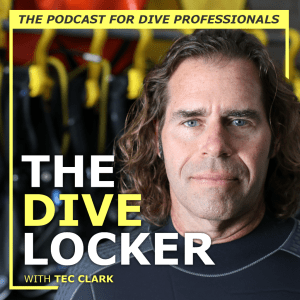 | It’s hard to keep up with everything going on in the diving industry. To be a successful dive professional you need to be in the know. Join industry leader Tec Clark every week as he explores the latest in diving industry resources that make you excellent at teaching techniques, risk management and diving business. If you want to succeed as a dive professional this is the podcast for you. |
 | Never before has the entire underwater industry come together in one place & without barriers. The most interesting people underwater share their success stories, expertise, & just plain ‘ol advice. Leaders from travel to equipment, aquariums to scuba instructors, mermaids to boat captains, & everything in between are all right here. If you love the water & want to know “how they did it” or “why they do it”, your wait is over! Kenny Dyal brings top talent to help you along your underwater journey. “Let’s show the rest of the world, the rest of the world.” |
 | The BiG Scuba Podcast is a new, independent podcast dedicated to all things diving and ocean related. Its hosted by two friends, Ian, and Gemma. Our aim is to provide a light hearted podcast for all levels of divers and also non-divers with a view to encouraging the non-divers to consider entering the water. We hope to bring you current dive and marine related news and information with the added BIG twist. Give us a listen and get inspired about all things scuba. |
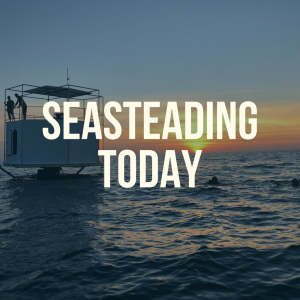 | Meet the pioneering minds of seasteading. The visionaries, the technologists, the entrepreneurs, the architects, the mariners, the engineers – the bold, forward thinking people who will improve humanity and the planet by establishing floating cities, where we are free to experiment with new means of living together on the blue frontier. |
 | The Blue Economy Primer is an education and research-focused podcast hosted by nonprofit Deep Blue Academy. We offer interviews with globally recognized experts to inform listeners about concepts and technology related to the Blue Economy, emerging Blue Technologies, Regenerative Marine Infrastructure, and resilient coastal community initiatives. This New Orleans-based podcast allows you to learn from the experts and apply the practical tools and solution sets that will empower at-risk coastal communities to adapt and thrive in an age of climate crisis and economic discontinuity. |
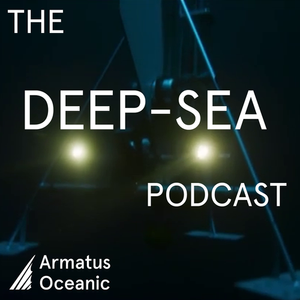 | A couple of deep-sea scientists talk everything deep sea! Interesting facts, recent news, myth-busting and interviews with the most interesting people we know. |
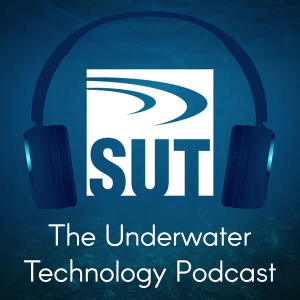 | Weekly short podcast from the Society for Underwater Technology featuring news & an interview with an expert on underwater technology, engineering, science, history & policy from across the international subsea world. For more about SUT visit www.sut.org, email info@sut.org SUT is a Learned Society for underwater technology, engineering & science established 1966. We’re a Charity / Not for Profit in most of the countries where we operate. Local branches in Australia, Brazil, Canada, China, Malaysia, Middle East, Norway, Singapore, UK, USA, West Africa. |
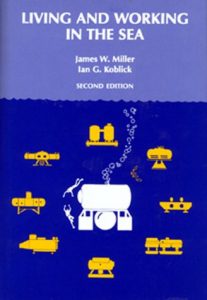 | Living and Working in the SeaEarth’s rich and fascinating oceans have long rewarded both explorers and treasure-seekers. The compelling benefits of actually living beneath the sea have been recognized only relatively recently, spurring ingenious attempts to construct human habitats for seafloor living. You can trace the progress of these attempts in “Living and Working in the Sea”. This definitive source illuminates the challenges and excitement as well as the perils and frustrations of undersea living. It shows how the development of saturation diving and seafloor technology led to the use of over 65 undersea habitats during the past three decades. Over 170 photographs – most of them shown here for the first time – illustrate the technical details and scientific capabilities of seafloor habitation. You will find out how a wide variety of habitats were designed and constructed, what materials were used and how habitats are operated and maintained. The development of special saturation diving procedures is also traced. In addition, revealing personal accounts from hundreds of aquanauts give you a vivid sense of life beneath the waves. The authors fully document the operation of working habitats such as Sealab-II, Hydrolab, Conshelf-III, La Chalupa, and Helgoland. You gain practical information on -* Food and water management * Carbon dioxide and odor removal * Communication, cooking, and lighting * Emergency facilities and procedures * Medical and psychological issues * Open-sea operations A brief history of diving recounts the earliest efforts to extend submergence time beyond normal human limits. You also get a look into the future of undersea habitation – a future with underwater hotels, classrooms, and even water-breathing aquanauts. “Living and Working in the Sea” covers every facet of the challenge of living beneath the seas. No other single source on the subject is as comprehensive or detailed. Oceanographic engineers, technologists, researchers, and explorers, as well as scientific and sport divers will refer to this undersea “bible” again and again. |
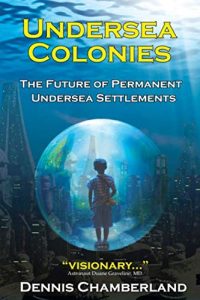 | Undersea ColoniesOf all one hundred billion humans who have ever lived, not a single one has gone to live permanently undersea. While we have had the technology to settle this vast, three dimensional domain for over half a century, it remains empty of outposts, colonies or cities – or even of a single settler. While its immense territory covers nearly three quarters of the globe, no one has ever gone there to stay. In this book, Dennis Chamberland traces the history of the aquanaut from the first tentative 24 hour experiment in 1962 until today. Surprisingly, a careful reading of the record of humankind’s penetration of the oceans reveals misdirected starts, misunderstandings of the human’s capacity to adapt and, eventually, a great abandonment of the quest. But now, Chamberland unveils a visionary strategy and a fresh, new look at previous challenges that will soon open up the expansive undersea regions called Aquatica. Here will arrive 21st century pioneers, colonists and families who will become the first Aquaticans in what may yet prove to be the greatest human adventure in all of history. |
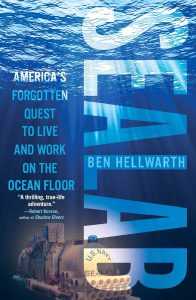 | Sealab: America’s Forgotten Quest to Live and Work on the Ocean FloorWhile NASA was trying to put a man on the moon, the US Navy launched a series of daring experiments to prove that divers could live and work from a sea-floor base. When the first underwater “habitat” called Sealab was tested in the early 1960s, conventional dives had strict depth limits and lasted for only minutes, not the hours and even days that the visionaries behind Sealab wanted to achieve—for purposes of exploration, scientific research, and to recover submarines and aircraft that had sunk along the continental shelf. The unlikely father of Sealab, George Bond, was a colorful former country doctor who joined the Navy later in life and became obsessed with these unanswered questions: How long can a diver stay underwater? How deep can a diver go? Sealab never received the attention it deserved, yet the program inspired explorers like Jacques Cousteau, broke age-old depth barriers, and revolutionized deep-sea diving by demonstrating that living on the seabed was not science fiction. Today divers on commercial oil rigs and Navy divers engaged in classified missions rely on methods pioneered during Sealab. Sealab is a true story of heroism and discovery: men unafraid to test the limits of physical endurance to conquer a hostile undersea frontier. It is also a story of frustration and a government unwilling to take the same risks underwater that it did in space. Ben Hellwarth, a veteran journalist, interviewed many surviving participants from the three Sealab experiments and conducted extensive documentary research to write the first comprehensive account of one of the most important and least known experiments in US history. |
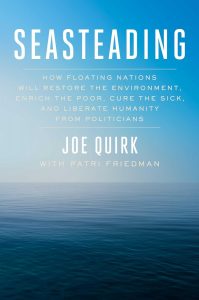 | Seasteading: How Floating Nations Will Restore the Environment, Enrich the Poor, Cure the Sick, and Liberate Humanity from Politicians
Two-thirds of our globe is Planet Ocean, not Planet Earth. Imagine a vast new source of sustainable and renewable energy that would also bring more equitable economies. A previously untapped source of farming that could produce significant new sources of nutrition. Future societies where people could choose the communities they want to live in, free from the restrictions of conventional citizenship. This bold vision of our near future as imagined in Seasteading attracted the powerful support of Silicon Valley’s Peter Thiel—and it may be drawing close to reality. Our planet is suffering from serious environmental problems: coastal flooding due to severe storms caused in part by atmospheric pollution and diminishing natural resources among them. But the seas can be home to a new breed of pioneers, seasteaders, who are willing to homestead the Blue Frontier. Oil platforms and cruise ships already inhabit the waters; now it’s time to take the next step to full-fledged ocean civilizations. Joe Quirk and Patri Friedman show us how cities built on floating platforms in the ocean will work, and they profile some of the visionaries who are implementing basic concepts of seasteading today. An entrepreneur’s dream, these floating cities will become laboratories for innovation and creativity. Seasteading may be visionary, but it already has begun proving the adage that yesterday’s science fiction is tomorrow’s science fact. Welcome to seavilization. |
 | Jacques Cousteau: The Sea King
An unprecedented and masterfully told biography of Jacques Cousteau that reveals for the first time the fascinating and compelling individual behind this famous television personality. Inventor of the aqualung and fearless scuba diver, Jacques Cousteau opened up the ocean to a mass audience for the first time. Here, with the cooperation of many of the subjects closest confidants and family, Brad Matsen makes clear the full picture of his remarkable life, showing the father, military man, inventor, entrepreneur, and adventurer behind the public face. Vividly conveying the people, the science, and the lure of the sea that shaped Cousteau’s life, Matsen paints a luminous portrait of a man who profoundly changed the way we live on our planet. |
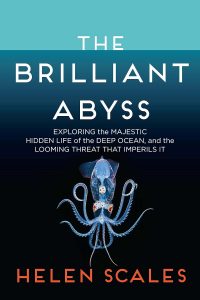 | The Brilliant Abyss: Exploring the Majestic Hidden Life of the Deep Ocean, and the Looming Threat That Imperils It
A marine biologist vividly brings alive the extraordinary ecosystem of the deep ocean—a realm about which we know less than we do about the Moon—and shows how protecting rather than exploiting it will benefit mankind. “The oceans have always shaped human lives,” writes marine biologist Helen Scales in her vibrant new book The Brilliant Abyss, but the surface and the very edges have so far mattered the most. “However, one way or another, the future ocean is the deep ocean.” A golden era of deep-sea discovery is underway. Revolutionary studies in the deep are rewriting the very notion of life on Earth and the rules of what is possible. In the process, the abyss is being revealed as perhaps the most amazing part of our planet, with a topography even more varied and extreme than its Earthbound counterpart. Teeming with unsuspected life, an extraordinary interconnected ecosystem deep below the waves has a huge effect on our daily lives, influencing climate and weather systems, with the potential for much more—good or bad depending on how it is exploited. Currently the fantastic creatures that live in the deep—many of them incandescent in a world without light—and its formations capture and trap vast quantities of carbon that would otherwise poison our atmosphere; and novel bacteria as yet undiscovered hold the promise of potent new medicines. Yet the deep also holds huge mineral riches lusted after by many nations and corporations; mining them could ultimately devastate the planet, compounded by the deepening impacts of ubiquitous pollutants and rampant overfishing. Eloquently and passionately, Helen Scales brings to life the majesty and mystery of an alien realm that nonetheless sustains us, while urgently making clear the price we could pay if it is further disrupted. The Brilliant Abyss is at once a revelation and a clarion call to preserve this vast unseen world. |
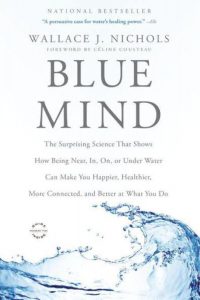 | Blue Mind: The Surprising Science That Shows How Being Near, In, On, or Under Water Can Make You Happier, Healthier, More Connected, and Better at What You Do
Why are we drawn to the ocean each summer? Why does being near water set our minds and bodies at ease? In Blue Mind, Wallace J. Nichols revolutionizes how we think about these questions, revealing the remarkable truth about the benefits of being in, on, under, or simply near water. Blue Mind not only illustrates the crucial importance of our connection to water-it provides a paradigm shifting “blueprint” for a better life on this Blue Marble we call home. |